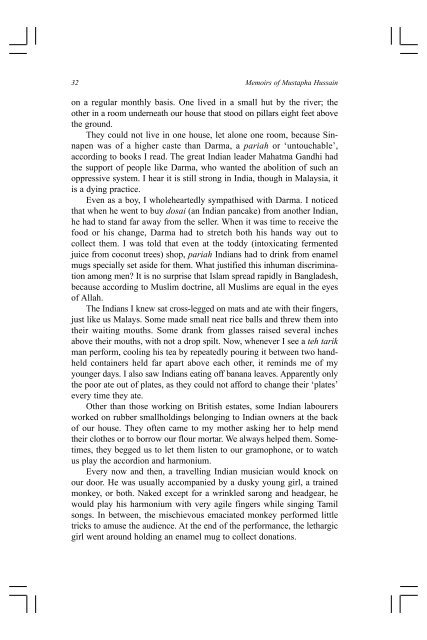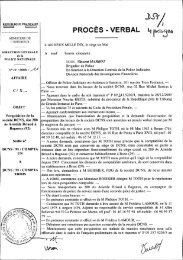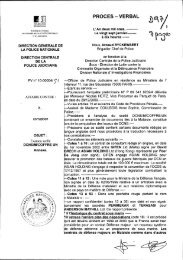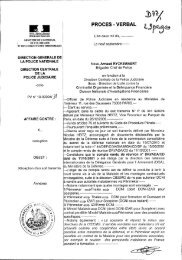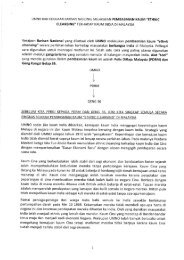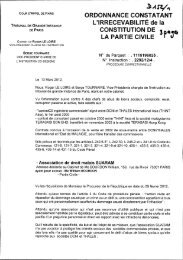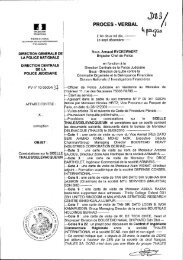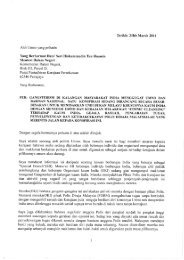- Page 2:
MALAY NATIONALISM BEFORE UMNO: THE
- Page 5 and 6:
Published and distributed by UTUSAN
- Page 7 and 8:
vi Contents 28. KRIS (July-August 1
- Page 9 and 10:
Acknowledgements This abridged and
- Page 11 and 12: Introduction Insun Sony Mustapha Th
- Page 13 and 14: xii Introduction Perak throne. This
- Page 15 and 16: xiv Introduction All-Malayan Counci
- Page 17 and 18: Glossary alir - floating board with
- Page 19 and 20: xviii Glossary ilmu pengasih - chan
- Page 21 and 22: xx Glossary rojak - mixed sliced ve
- Page 23 and 24: Circa 1939 - Students and teaching
- Page 25 and 26: 1942 - Mustapha’s older brother A
- Page 27 and 28: 1953 - Mustapha and his father, Haj
- Page 29 and 30: 1980s - Mustapha with Malay nationa
- Page 31 and 32: 1985 - Mustapha, ever cheerful, cle
- Page 33 and 34: 2 Memoirs of Mustapha Hussain of Ma
- Page 35 and 36: 4 Memoirs of Mustapha Hussain When
- Page 37 and 38: 6 Memoirs of Mustapha Hussain 2 Mat
- Page 39 and 40: 8 Memoirs of Mustapha Hussain had m
- Page 41 and 42: 10 Memoirs of Mustapha Hussain poin
- Page 43 and 44: 12 Memoirs of Mustapha Hussain Germ
- Page 45 and 46: 14 Memoirs of Mustapha Hussain The
- Page 47 and 48: 16 Memoirs of Mustapha Hussain Moth
- Page 49 and 50: 18 Memoirs of Mustapha Hussain was
- Page 51 and 52: 20 Memoirs of Mustapha Hussain 4 Ka
- Page 53 and 54: 22 Memoirs of Mustapha Hussain reme
- Page 55 and 56: 24 Memoirs of Mustapha Hussain clea
- Page 57 and 58: 26 Memoirs of Mustapha Hussain 5 Re
- Page 59 and 60: 28 Memoirs of Mustapha Hussain Duri
- Page 61: 30 Memoirs of Mustapha Hussain youn
- Page 65 and 66: 34 Memoirs of Mustapha Hussain Esta
- Page 67 and 68: 36 Memoirs of Mustapha Hussain soph
- Page 69 and 70: 38 Memoirs of Mustapha Hussain Mala
- Page 71 and 72: 40 Memoirs of Mustapha Hussain For
- Page 73 and 74: 42 Memoirs of Mustapha Hussain fond
- Page 75 and 76: 44 Memoirs of Mustapha Hussain agai
- Page 77 and 78: 46 Memoirs of Mustapha Hussain my h
- Page 79 and 80: 48 Memoirs of Mustapha Hussain down
- Page 81 and 82: 50 Memoirs of Mustapha Hussain sent
- Page 83 and 84: 52 Memoirs of Mustapha Hussain all
- Page 85 and 86: 54 Memoirs of Mustapha Hussain alon
- Page 87 and 88: 56 Memoirs of Mustapha Hussain but
- Page 89 and 90: 58 Memoirs of Mustapha Hussain I an
- Page 91 and 92: 60 Memoirs of Mustapha Hussain othe
- Page 93 and 94: 62 Memoirs of Mustapha Hussain 10 O
- Page 95 and 96: 64 Memoirs of Mustapha Hussain One
- Page 97 and 98: 66 Memoirs of Mustapha Hussain me d
- Page 99 and 100: 68 Memoirs of Mustapha Hussain rock
- Page 101 and 102: 70 Memoirs of Mustapha Hussain repu
- Page 103 and 104: 72 Memoirs of Mustapha Hussain 11 L
- Page 105 and 106: 74 Memoirs of Mustapha Hussain a pa
- Page 107 and 108: 76 Memoirs of Mustapha Hussain and
- Page 109 and 110: 78 Memoirs of Mustapha Hussain One
- Page 111 and 112: 80 Memoirs of Mustapha Hussain Well
- Page 113 and 114:
82 Memoirs of Mustapha Hussain A vo
- Page 115 and 116:
84 Memoirs of Mustapha Hussain to s
- Page 117 and 118:
86 Memoirs of Mustapha Hussain They
- Page 119 and 120:
88 Memoirs of Mustapha Hussain cons
- Page 121 and 122:
90 Memoirs of Mustapha Hussain with
- Page 123 and 124:
92 Memoirs of Mustapha Hussain I fo
- Page 125 and 126:
94 Memoirs of Mustapha Hussain Five
- Page 127 and 128:
96 Memoirs of Mustapha Hussain 13 M
- Page 129 and 130:
98 Memoirs of Mustapha Hussain I re
- Page 131 and 132:
100 Memoirs of Mustapha Hussain “
- Page 133 and 134:
102 Memoirs of Mustapha Hussain I d
- Page 135 and 136:
104 Memoirs of Mustapha Hussain Mr
- Page 137 and 138:
106 Memoirs of Mustapha Hussain at
- Page 139 and 140:
108 Memoirs of Mustapha Hussain inc
- Page 141 and 142:
110 Memoirs of Mustapha Hussain Mr
- Page 143 and 144:
112 Memoirs of Mustapha Hussain 15
- Page 145 and 146:
114 Memoirs of Mustapha Hussain att
- Page 147 and 148:
116 Memoirs of Mustapha Hussain rec
- Page 149 and 150:
118 Memoirs of Mustapha Hussain 16
- Page 151 and 152:
120 Memoirs of Mustapha Hussain fly
- Page 153 and 154:
122 Memoirs of Mustapha Hussain Off
- Page 155 and 156:
124 Memoirs of Mustapha Hussain eve
- Page 157 and 158:
126 Memoirs of Mustapha Hussain was
- Page 159 and 160:
128 Memoirs of Mustapha Hussain an
- Page 161 and 162:
130 Memoirs of Mustapha Hussain Min
- Page 163 and 164:
132 Memoirs of Mustapha Hussain lef
- Page 165 and 166:
134 Memoirs of Mustapha Hussain pla
- Page 167 and 168:
136 Memoirs of Mustapha Hussain par
- Page 169 and 170:
138 Memoirs of Mustapha Hussain I w
- Page 171 and 172:
140 Memoirs of Mustapha Hussain At
- Page 173 and 174:
142 Memoirs of Mustapha Hussain cou
- Page 175 and 176:
144 Memoirs of Mustapha Hussain Not
- Page 177 and 178:
146 Memoirs of Mustapha Hussain Ibr
- Page 179 and 180:
148 Memoirs of Mustapha Hussain I r
- Page 181 and 182:
150 Memoirs of Mustapha Hussain Aft
- Page 183 and 184:
152 Memoirs of Mustapha Hussain Oth
- Page 185 and 186:
154 Memoirs of Mustapha Hussain sho
- Page 187 and 188:
156 Memoirs of Mustapha Hussain ins
- Page 189 and 190:
158 Memoirs of Mustapha Hussain He
- Page 191 and 192:
160 Memoirs of Mustapha Hussain Ona
- Page 193 and 194:
162 Memoirs of Mustapha Hussain 9.
- Page 195 and 196:
164 Memoirs of Mustapha Hussain 20
- Page 197 and 198:
166 Memoirs of Mustapha Hussain our
- Page 199 and 200:
168 Memoirs of Mustapha Hussain Aft
- Page 201 and 202:
170 Memoirs of Mustapha Hussain we
- Page 203 and 204:
172 Memoirs of Mustapha Hussain Moh
- Page 205 and 206:
174 Memoirs of Mustapha Hussain hea
- Page 207 and 208:
176 Memoirs of Mustapha Hussain the
- Page 209 and 210:
178 Memoirs of Mustapha Hussain col
- Page 211 and 212:
180 Memoirs of Mustapha Hussain 10.
- Page 213 and 214:
182 Memoirs of Mustapha Hussain 21
- Page 215 and 216:
184 Memoirs of Mustapha Hussain was
- Page 217 and 218:
186 Memoirs of Mustapha Hussain Maj
- Page 219 and 220:
188 Memoirs of Mustapha Hussain fet
- Page 221 and 222:
190 Memoirs of Mustapha Hussain col
- Page 223 and 224:
192 Memoirs of Mustapha Hussain I t
- Page 225 and 226:
194 Memoirs of Mustapha Hussain cra
- Page 227 and 228:
196 Memoirs of Mustapha Hussain Aft
- Page 229 and 230:
198 Memoirs of Mustapha Hussain 22
- Page 231 and 232:
200 Memoirs of Mustapha Hussain I c
- Page 233 and 234:
202 Memoirs of Mustapha Hussain not
- Page 235 and 236:
204 Memoirs of Mustapha Hussain did
- Page 237 and 238:
206 Memoirs of Mustapha Hussain ing
- Page 239 and 240:
208 Memoirs of Mustapha Hussain 23
- Page 241 and 242:
210 Memoirs of Mustapha Hussain ite
- Page 243 and 244:
212 Memoirs of Mustapha Hussain hap
- Page 245 and 246:
214 Memoirs of Mustapha Hussain to
- Page 247 and 248:
216 Memoirs of Mustapha Hussain mil
- Page 249 and 250:
218 Memoirs of Mustapha Hussain Far
- Page 251 and 252:
220 Memoirs of Mustapha Hussain bro
- Page 253 and 254:
222 Memoirs of Mustapha Hussain was
- Page 255 and 256:
224 Memoirs of Mustapha Hussain oth
- Page 257 and 258:
226 Memoirs of Mustapha Hussain 24
- Page 259 and 260:
228 Memoirs of Mustapha Hussain Vis
- Page 261 and 262:
230 Memoirs of Mustapha Hussain bee
- Page 263 and 264:
232 Memoirs of Mustapha Hussain six
- Page 265 and 266:
234 Memoirs of Mustapha Hussain Sol
- Page 267 and 268:
236 Memoirs of Mustapha Hussain new
- Page 269 and 270:
238 Memoirs of Mustapha Hussain Cap
- Page 271 and 272:
240 Memoirs of Mustapha Hussain att
- Page 273 and 274:
242 Memoirs of Mustapha Hussain bre
- Page 275 and 276:
244 Memoirs of Mustapha Hussain 25
- Page 277 and 278:
246 Memoirs of Mustapha Hussain Bri
- Page 279 and 280:
248 Memoirs of Mustapha Hussain mom
- Page 281 and 282:
250 Memoirs of Mustapha Hussain Sut
- Page 283 and 284:
252 Memoirs of Mustapha Hussain Upo
- Page 285 and 286:
254 Memoirs of Mustapha Hussain Chi
- Page 287 and 288:
256 Memoirs of Mustapha Hussain acc
- Page 289 and 290:
258 Memoirs of Mustapha Hussain Boo
- Page 291 and 292:
260 Memoirs of Mustapha Hussain had
- Page 293 and 294:
262 Memoirs of Mustapha Hussain the
- Page 295 and 296:
264 Memoirs of Mustapha Hussain One
- Page 297 and 298:
266 Memoirs of Mustapha Hussain I a
- Page 299 and 300:
268 Memoirs of Mustapha Hussain 28
- Page 301 and 302:
270 Memoirs of Mustapha Hussain in
- Page 303 and 304:
272 Memoirs of Mustapha Hussain to
- Page 305 and 306:
274 Memoirs of Mustapha Hussain For
- Page 307 and 308:
276 Memoirs of Mustapha Hussain may
- Page 309 and 310:
278 Memoirs of Mustapha Hussain to
- Page 311 and 312:
280 Memoirs of Mustapha Hussain Wor
- Page 313 and 314:
282 Memoirs of Mustapha Hussain Kua
- Page 315 and 316:
284 Memoirs of Mustapha Hussain lon
- Page 317 and 318:
286 Memoirs of Mustapha Hussain bet
- Page 319 and 320:
288 Memoirs of Mustapha Hussain On
- Page 321 and 322:
290 Memoirs of Mustapha Hussain Gen
- Page 323 and 324:
292 Memoirs of Mustapha Hussain and
- Page 325 and 326:
294 Memoirs of Mustapha Hussain 30
- Page 327 and 328:
296 Memoirs of Mustapha Hussain sle
- Page 329 and 330:
298 Memoirs of Mustapha Hussain fir
- Page 331 and 332:
300 Memoirs of Mustapha Hussain Aft
- Page 333 and 334:
302 Memoirs of Mustapha Hussain wen
- Page 335 and 336:
304 Memoirs of Mustapha Hussain 31
- Page 337 and 338:
306 Memoirs of Mustapha Hussain dis
- Page 339 and 340:
308 Memoirs of Mustapha Hussain A C
- Page 341 and 342:
310 Memoirs of Mustapha Hussain cig
- Page 343 and 344:
312 Memoirs of Mustapha Hussain ret
- Page 345 and 346:
314 Memoirs of Mustapha Hussain for
- Page 347 and 348:
316 Memoirs of Mustapha Hussain tha
- Page 349 and 350:
318 Memoirs of Mustapha Hussain 32
- Page 351 and 352:
320 Memoirs of Mustapha Hussain be
- Page 353 and 354:
322 Memoirs of Mustapha Hussain all
- Page 355 and 356:
324 Memoirs of Mustapha Hussain tio
- Page 357 and 358:
326 Memoirs of Mustapha Hussain As
- Page 359 and 360:
328 Memoirs of Mustapha Hussain in
- Page 361 and 362:
330 Memoirs of Mustapha Hussain Mai
- Page 363 and 364:
332 Memoirs of Mustapha Hussain a f
- Page 365 and 366:
334 Memoirs of Mustapha Hussain pre
- Page 367 and 368:
336 Memoirs of Mustapha Hussain rub
- Page 369 and 370:
338 Memoirs of Mustapha Hussain not
- Page 371 and 372:
340 Memoirs of Mustapha Hussain thr
- Page 373 and 374:
342 Memoirs of Mustapha Hussain 5.
- Page 375 and 376:
344 Memoirs of Mustapha Hussain the
- Page 377 and 378:
346 Memoirs of Mustapha Hussain How
- Page 379 and 380:
348 Memoirs of Mustapha Hussain Wha
- Page 381 and 382:
350 Memoirs of Mustapha Hussain sta
- Page 383 and 384:
352 Memoirs of Mustapha Hussain nee
- Page 385 and 386:
354 Memoirs of Mustapha Hussain pro
- Page 387 and 388:
356 Memoirs of Mustapha Hussain sin
- Page 389 and 390:
358 Memoirs of Mustapha Hussain kno
- Page 391 and 392:
360 Memoirs of Mustapha Hussain the
- Page 393 and 394:
362 Memoirs of Mustapha Hussain 36
- Page 395 and 396:
364 Memoirs of Mustapha Hussain API
- Page 397 and 398:
366 Memoirs of Mustapha Hussain Maj
- Page 399 and 400:
368 Memoirs of Mustapha Hussain One
- Page 401 and 402:
370 Memoirs of Mustapha Hussain han
- Page 403 and 404:
372 Memoirs of Mustapha Hussain tim
- Page 405 and 406:
374 Memoirs of Mustapha Hussain Bur
- Page 407 and 408:
376 Memoirs of Mustapha Hussain UMN
- Page 409 and 410:
378 Memoirs of Mustapha Hussain 38
- Page 411 and 412:
380 Memoirs of Mustapha Hussain com
- Page 413 and 414:
382 Memoirs of Mustapha Hussain the
- Page 415 and 416:
384 Memoirs of Mustapha Hussain str
- Page 417 and 418:
386 Memoirs of Mustapha Hussain Ser
- Page 419 and 420:
388 Memoirs of Mustapha Hussain the
- Page 421 and 422:
390 Memoirs of Mustapha Hussain nat
- Page 423 and 424:
392 Memoirs of Mustapha Hussain not
- Page 425 and 426:
394 Memoirs of Mustapha Hussain rea
- Page 427 and 428:
396 Memoirs of Mustapha Hussain own
- Page 429 and 430:
398 Memoirs of Mustapha Hussain Suc
- Page 431 and 432:
400 Memoirs of Mustapha Hussain imp
- Page 433 and 434:
402 Memoirs of Mustapha Hussain som
- Page 435 and 436:
404 Memoirs of Mustapha Hussain App
- Page 437 and 438:
406 Memoirs of Mustapha Hussain Aft
- Page 439 and 440:
408 Memoirs of Mustapha Hussain Eve
- Page 441 and 442:
410 Memoirs of Mustapha Hussain Aft
- Page 443 and 444:
412 Index Index Abbas bin Haji Alia
- Page 445 and 446:
414 Index Cambodia/Cambodian, 155,
- Page 447 and 448:
416 Index Hatta, Dr Mohammad, 270,
- Page 449 and 450:
418 Index in Kuala Lumpur, 187-207
- Page 451 and 452:
420 Index Mohd Mustafa bin Ali, 138
- Page 453 and 454:
422 Index Straits Settlements, 7, 6


